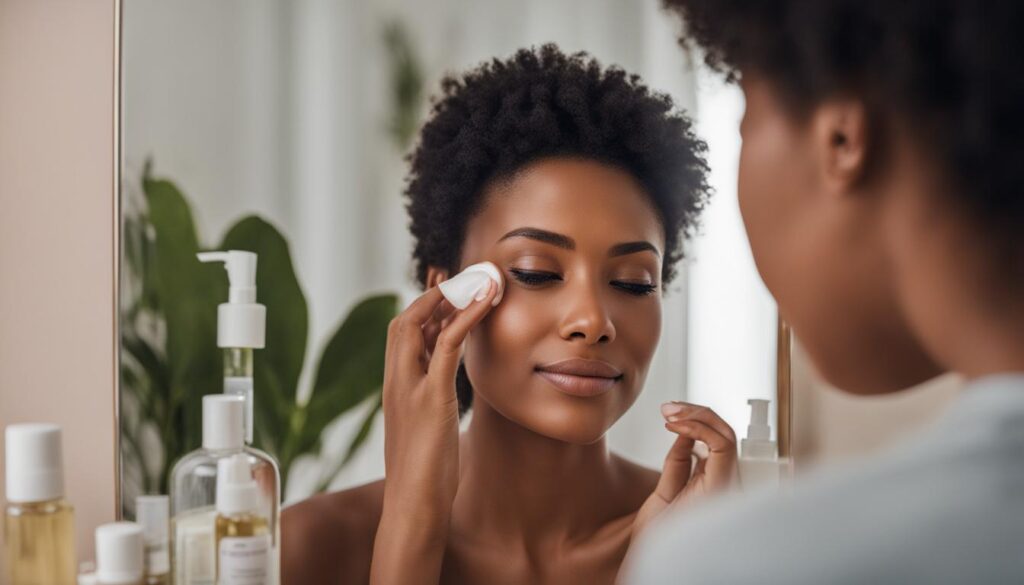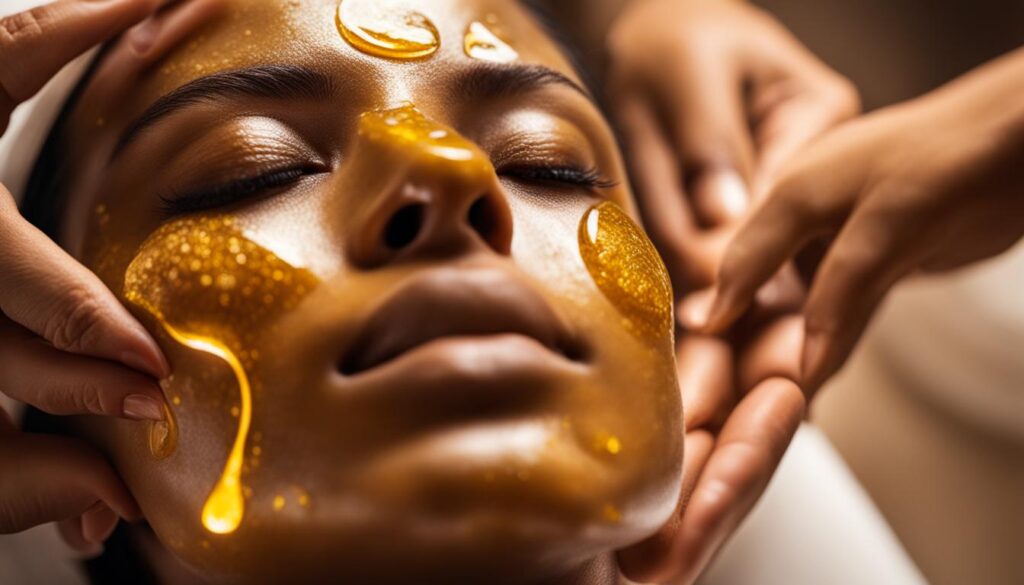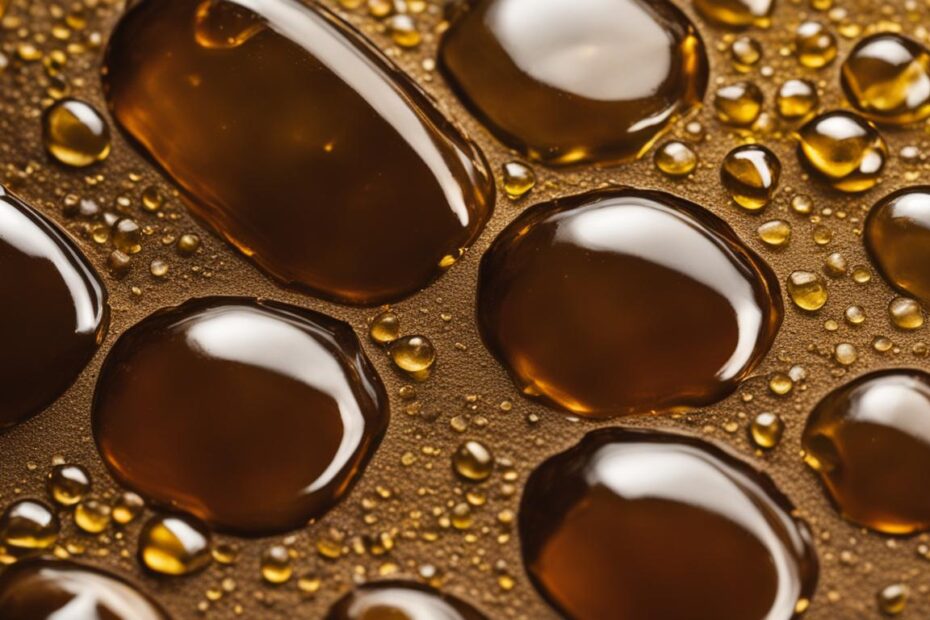When it comes to skincare, we want products that nourish and enhance our skin without causing pore blockage or acne breakouts. Castor oil is a popular natural oil that has gained attention for its potential benefits for the skin. But does castor oil block pores? Let’s explore the facts.
Castor oil is classified as a non-comedogenic oil, meaning it has a low rating on the comedogenic scale. This scale measures the pore-clogging potential of substances, ranging from 0 (non-comedogenic) to 5 (highly comedogenic). Castor oil’s low rating indicates that it is unlikely to clog pores and cause acne breakouts.
One of the reasons why castor oil is considered non-comedogenic is its composition. It is rich in a fatty acid called ricinoleic acid, which has anti-inflammatory and antibacterial properties. These properties can help promote healthier-looking skin by reducing inflammation and fighting against bacteria that can contribute to acne.
Furthermore, castor oil can act as a moisturizer, providing hydration to the skin. It contains vitamins and fatty acids that nourish the skin and contribute to its overall health. Additionally, castor oil is rich in antioxidants, which help protect the skin from free radicals that can cause premature aging.
While castor oil is generally safe for most skin types, it is important to note that individual experiences may vary. As with any skincare product, it is always recommended to perform a patch test before incorporating it into your routine, especially if you have sensitive or acne-prone skin.
In conclusion, castor oil is unlikely to clog pores or cause acne breakouts. Its non-comedogenic properties, along with its moisturizing and beneficial compounds like ricinoleic acid, make it a potential option for those looking to improve their skin’s health. However, it’s important to consult with a dermatologist or skincare professional for personalized advice.
Key Takeaways:
- Castor oil is a non-comedogenic oil with a low rating on the comedogenic scale.
- Its composition, especially the presence of ricinoleic acid, contributes to its non-pore-clogging and acne-fighting properties.
- Castor oil can provide hydration and nourishment to the skin, thanks to its moisturizing and nutrient-rich components.
- Individuals with sensitive or acne-prone skin should perform a patch test before using castor oil.
- Consulting with a skincare professional is always recommended for personalized advice on the use of castor oil for skincare.
Understanding Comedogenicity and the Comedogenic Scale
When it comes to skincare, understanding the comedogenicity of different substances is crucial. Comedogenicity refers to the potential of a substance to clog pores and lead to the formation of comedones, such as blackheads and whiteheads. This plays a significant role in the development of acne lesions, breakouts, and other pore-clogging issues.
To assess the comedogenicity of substances, the skincare industry utilizes the comedogenic scale. This scale ranges from 0 to 5, with 0 indicating non-comedogenic substances that are unlikely to cause pore blockage, and 5 indicating highly comedogenic substances that have a high likelihood of clogging pores and contributing to acne lesions.
Now, let’s take a closer look at how castor oil fits into this scale and its potential impact on pore-clogging issues.
The Comedogenic Scale
The comedogenic scale is a valuable tool for understanding whether a substance is likely to contribute to pore blockage and breakouts. Here is an overview of the comedogenic scale ratings:
| Comedogenic Rating | Description |
|---|---|
| 0 | Non-comedogenic – Unlikely to clog pores |
| 1 | Low – Slightly low pore-clogging potential |
| 2 | Moderate – Some potential for clogged pores |
| 3 | Moderately High – May clog pores in some individuals |
| 4 | High – Likely to clog pores, leading to breakouts |
| 5 | Highly Comedogenic – Very likely to clog pores, causing breakouts |
Using this scale, individuals can make informed decisions about the skincare products they choose to incorporate into their routines.
Castor Oil’s Comedogenic Rating
Castor oil, commonly used in skincare, has been assigned a comedogenic rating. With its unique properties, castor oil falls on the lower end of the comedogenic scale, making it less likely to contribute to clogged pores and breakouts.
This low comedogenic rating is attributed to the composition of castor oil, specifically its ricinoleic acid content. Ricinoleic acid has known anti-inflammatory and antibacterial properties, which can help maintain skin health and reduce the likelihood of developing acne lesions, such as comedones.
It is important to note that while castor oil has a low comedogenic rating, individual responses may vary. Some individuals may still experience adverse reactions or breakouts when using castor oil. Conducting a patch test and monitoring your skin’s response is always recommended before incorporating any new skincare ingredient.
Next, we will explore the numerous benefits that castor oil offers to the skin and how it can be incorporated into your skincare routine.
The Benefits of Castor Oil for Skin
Castor oil offers numerous benefits for the skin, making it a popular choice in skincare routines. Packed with essential nutrients and compounds, this versatile oil provides a range of advantages that contribute to the overall health and appearance of the skin.
Anti-Inflammatory and Antibacterial Properties
One of the key components of castor oil is ricinoleic acid, which possesses powerful anti-inflammatory and antibacterial properties. These properties help soothe inflammation, reduce redness, and combat bacteria on the skin’s surface. By addressing inflammation and combating bacteria, castor oil promotes a healthier complexion and can aid in the prevention of bacterial skin infections.
Deep Moisturization
Castor oil functions as an effective moisturizer for the skin. Its thick consistency allows it to create a protective barrier on the skin’s surface, preventing moisture loss and keeping the skin hydrated. Regular use of castor oil can help alleviate dryness, providing long-lasting moisturization and improving overall skin texture.
Rich in Vitamins and Fatty Acids
Loaded with vitamins and fatty acids, castor oil nourishes the skin and supports its overall health. Vitamins A and E present in castor oil help promote the production of collagen and elastin, essential for maintaining skin elasticity and reducing the appearance of fine lines and wrinkles. Fatty acids, such as omega-3 and omega-6, help strengthen the skin’s barrier function and protect it from environmental damage.
Antioxidant Protection
Castor oil is rich in antioxidants that combat free radicals, which are harmful molecules that damage the skin and accelerate the aging process. These antioxidants help neutralize free radicals, providing protection against oxidative stress and assisting in maintaining a youthful and radiant complexion.
To summarize, castor oil offers a range of benefits for the skin, including its anti-inflammatory and antibacterial properties, moisturizing effects, and its ability to nourish the skin with vitamins and fatty acids. Additionally, the antioxidants in castor oil help protect the skin from oxidative damage. With its multitude of advantages, incorporating castor oil into your skincare routine can help promote healthy, radiant-looking skin.
Who Should Use Castor Oil for Skincare?
Castor oil is a versatile option that can be beneficial for individuals with different skin types. Whether you have mature skin, dry skin, oily skin, or struggle with acne, castor oil can be incorporated into your skincare routine to address specific concerns.
For Mature and Dry Skin
If you have mature or dry skin that requires extra moisturization, castor oil can work wonders. Its hydrating properties help retain moisture, leaving the skin feeling nourished and supple. Incorporate castor oil into your skincare routine to combat dryness and support a more youthful complexion.
For Oily Skin
While castor oil may seem counterintuitive for oily skin, it can still play a role in your skincare regimen. However, it’s important to use it in moderation since it is an oil. Applying a small amount of castor oil can help balance oil production and hydrate the skin without causing excessive greasiness.
For Acne-Prone Skin
If you struggle with acne or inflammation, castor oil may provide some relief. It has anti-inflammatory and antibacterial properties that can help calm irritated skin and reduce redness. By incorporating castor oil into your skincare routine, you may experience a reduction in breakouts and improved overall skin health. However, those with fungal acne should exercise caution, as castor oil may exacerbate the condition.
For Sensitive Skin
If you have sensitive skin, it’s important to perform a patch test before using castor oil to ensure compatibility. While castor oil is generally safe for most individuals, everyone’s skin reacts differently. Testing it on a small area of your skin will help determine if it causes any adverse reactions. If you experience any sensitivity, it’s best to avoid using castor oil.
Ultimately, castor oil can be a valuable addition to your skincare routine, catering to various skin types and concerns. From mature and dry skin to oily and acne-prone skin, it offers a range of benefits when used correctly and in appropriate quantities.

How to Incorporate Castor Oil into Your Skincare Routine
When it comes to skincare, incorporating castor oil into your routine can provide numerous benefits. This versatile oil can be used as a moisturizer, makeup remover, or as part of a face mask. Additionally, it offers unique advantages in improving the appearance of fine lines and wrinkles around the eyes.
To ensure the best results, it is crucial to select a high-quality and organic brand of castor oil. One such brand is the Queen of the Thrones Castor Oil, which is recommended by naturopathic doctors and other healthcare practitioners for its exceptional quality and effectiveness.
Using Castor Oil as a Moisturizer
When using castor oil as a moisturizer, simply apply a small amount to your face, focusing on dry areas. Gently massage the oil into your skin using circular motions until it is fully absorbed. The nourishing properties of castor oil will help hydrate your skin and leave it feeling soft and supple.
Makeup Removal with Castor Oil
Castor oil can also be an excellent natural makeup remover. Apply a small amount of the oil to a cotton pad and gently wipe away your makeup, paying particular attention to the eye area. The oil will effectively dissolve and lift away even stubborn waterproof makeup, leaving your skin clean and refreshed.
Benefits of a Castor Oil Face Mask
A castor oil face mask can provide deep hydration and nourishment to your skin. To create a mask, mix a tablespoon of castor oil with other natural ingredients such as honey, aloe vera gel, or yogurt. Apply the mask to your face, leave it on for 15-20 minutes, then rinse with warm water. This mask can help improve skin texture, reduce inflammation, and promote a healthy and radiant complexion.
Eye Treatment with Castor Oil
Due to its moisturizing and anti-aging properties, castor oil is particularly beneficial when used as an eye treatment. Apply a small amount of castor oil to your under-eye area using gentle tapping motions with your ring finger. This will help improve the appearance of fine lines, wrinkles, and dark circles, giving your eyes a more youthful and refreshed look.

By incorporating castor oil into your skincare routine, you can harness the power of this natural skincare ingredient to improve the health and appearance of your skin. Whether you choose to use it as a moisturizer, makeup remover, face mask, or eye treatment, castor oil offers a multitude of benefits for your skin. Remember to choose a high-quality brand and consult with a naturopathic doctor or skincare professional for personalized advice and recommendations.
The Drawbacks of Using Castor Oil for Acne
While castor oil can be beneficial for acne-prone skin, it may not suit all individuals. It’s important to consider the potential drawbacks and limitations of using castor oil as an acne treatment.
Drying Effect and Disruption of pH Balance
Castor oil has a drying effect on the skin, particularly with prolonged use. This can be problematic for individuals with dry or sensitive skin, as it may exacerbate dryness and lead to further irritation. Additionally, castor oil has the potential to disrupt the skin’s natural pH balance, which can contribute to skin concerns such as acne breakouts.
Lack of Scientific Evidence
While there are anecdotal reports of castor oil benefiting acne-prone skin, there is a lack of robust scientific evidence to support its effectiveness as an acne treatment. The available research is limited and inconclusive, making it difficult to draw definitive conclusions about the efficacy of castor oil for acne.
Potential Side Effects and Allergic Reactions
Some individuals may experience side effects when using castor oil on their skin. These can include redness, itching, irritation, or a rash. Additionally, certain individuals may have allergic reactions to castor oil, which can manifest as swelling, hives, or difficulty breathing. It’s important to perform a patch test before using castor oil on a larger area of the skin to check for any adverse reactions.
Misinformation Surrounding Castor Oil for Acne
There is a significant amount of misinformation circulating about castor oil and its benefits for acne. Claims that it can effectively treat acne, unclog pores, or eliminate breakouts are often not supported by scientific evidence. It’s important to rely on credible sources and consult with a dermatologist or skincare professional before incorporating castor oil into an acne treatment regimen.
| Drawbacks | Impact |
|---|---|
| Drying effect | Can exacerbate dryness and irritation |
| Disruption of pH balance | May contribute to acne breakouts |
| Lack of scientific evidence | Insufficient research to support efficacy |
| Potential side effects | Redness, itching, irritation, allergic reactions |
| Misinformation | Unsubstantiated claims about acne treatment benefits |
It’s important to weigh the potential drawbacks and limitations of using castor oil for acne before incorporating it into your skincare routine. If you have concerns or are unsure about its suitability for your skin, it’s best to consult with a dermatologist or skincare professional.
Conclusion:Does castor oil block pores
In conclusion, castor oil is a non-comedogenic oil that is safe to use on the skin. It does not clog pores or cause acne breakouts, making it suitable for individuals with acne-prone skin. Additionally, castor oil offers numerous benefits for the skin due to its anti-inflammatory and antibacterial properties.
When incorporated into a skincare routine, castor oil can provide moisturization and support overall skin health. It is especially beneficial for individuals with dry or mature skin who require extra hydration. However, those with sensitive or acne-prone skin should exercise caution and perform a patch test before using castor oil.
While castor oil is not a miracle cure for acne, it can be a useful addition to a skincare routine. It is important to note that scientific evidence supporting its efficacy as an acne treatment is limited. Nevertheless, by choosing a high-quality, organic brand, individuals can enjoy the potential benefits of castor oil while maintaining healthy and nourished skin.
FAQ
Is castor oil comedogenic? Does it block pores?
Castor oil is a non-comedogenic oil with a low rating on the comedogenic scale. It is unlikely to clog pores or cause acne breakouts.
What is comedogenicity and the comedogenic scale?
Comedogenicity refers to the ability of a substance to clog pores and potentially cause comedones, such as blackheads and whiteheads. The comedogenic scale ranges from 0 to 5, with 0 being non-comedogenic and 5 being highly comedogenic.
What are the benefits of castor oil for the skin?
Castor oil is rich in ricinoleic acid, which has anti-inflammatory and antibacterial properties that can support healthier-looking skin. It is a moisturizer that can help retain moisture and keep the skin hydrated. Castor oil also contains vitamins and fatty acids that contribute to skin health and can help reduce the appearance of aging. It is rich in antioxidants that can protect the skin from free radicals.
Who should use castor oil for skincare?
Castor oil can be used by individuals with different skin types. It works well as part of a skincare routine, especially for those with mature or dry skin who need extra moisturization. It can also be used on oily skin, but in moderation, as it is an oil. Castor oil may help support inflammation in acne-prone skin, but individuals with fungal acne should use caution. A patch test is recommended for those with sensitive skin to ensure compatibility.
How can castor oil be incorporated into a skincare routine?
Castor oil can be used as a moisturizer, makeup remover, or as part of a face mask. It is particularly beneficial around the eyes to improve the appearance of fine lines and wrinkles. When using castor oil, it is important to choose a high-quality, organic brand that is safe for direct use on the skin. Queen of the Thrones Castor Oil is recommended by naturopathic doctors and other healthcare practitioners.
Are there any drawbacks to using castor oil for acne?
While castor oil can be beneficial for acne-prone skin, it may not suit all individuals. It can have a drying effect on the skin, especially with prolonged use, and may disrupt the skin’s pH balance. Castor oil is not a proven acne treatment and lacks robust scientific evidence. It can also have potential side effects and may cause allergic reactions in some individuals. There is also a lot of misinformation surrounding the use of castor oil for acne.
